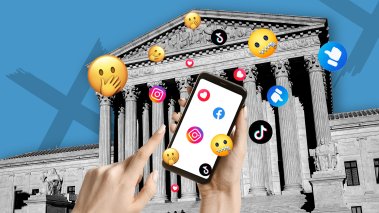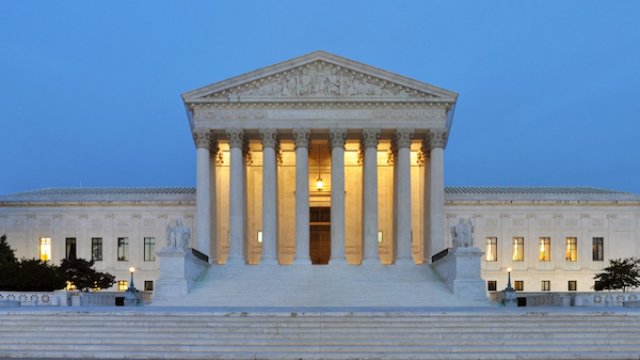Table of Contents
The Supreme Court, Big Tech, and the dark art of politics

This term, the Supreme Court will decide a cluster of cases — the most consequential in my 40-year career practicing First Amendment law — that will markedly shape the relationship between the government and social media.
The two most important cases, which the Supreme Court will hear on Monday, were brought by NetChoice, an internet industry group, after Florida and Texas passed laws regulating social media platforms’ content moderation practices. Together they will determine who controls the levers of content moderation on platforms like Facebook and X: the platforms themselves or state government.
The NetChoice cases should be easy for the nine justices to decide — the power should remain with the platforms, and here’s why.
Online communication technologies may be a relatively recent phenomenon, but the basic issue underlying these cases has been around since our founding. The Constitution’s Framers faced these same fundamental challenges when they adopted the First Amendment.
Unlike European governments, which reacted to the powerful new medium of the printing press by fashioning various ways to control and censor it, the United States became the first nation to embrace the technology as an essential component of its political system.
From the beginning, the press — the only private enterprise mentioned in the Constitution — was freed from government control in order to preserve personal and political freedom and hold the powerful accountable. The internet and social media are no different.
But now, in response to a variety of government crackdowns on social media across the country, the Court is being asked to decide whether freedom might better be secured by surrendering the power to determine what people see and hear on these platforms to the state.
In Texas and in Florida, legislatures responded to the perception that social media companies were discriminating against conservatives — such as by booting former President Donald Trump off the platform formerly known as Twitter — enacting laws giving the state control over the platforms’ content management decisions.

FIRE to Supreme Court: Only you can protect free speech online.
News
In a new friend-of-the-court filing, FIRE asks the Supreme Court to defend the right of social media platforms to decide what content to host and promote.
Florida targeted so-called “deplatforming” of political candidates, speech about candidates, or “journalistic enterprises,” while Texas prohibited “viewpoint-based” moderation practices. Enforcement of the Florida law was halted on First Amendment grounds, with the federal appeals court for the Eleventh Circuit noting that basic First Amendment principles prohibited the state from wresting control of editorial choices from individual platforms regardless of the nature of the platform.
In Texas, however, the First Amendment didn’t fare so well. In the Fifth Circuit court of appeals, writing for the majority of a three-judge panel, Judge Andrew Oldham concluded that the Texas law did not involve “media regulation” at all. Instead he argued that the platforms’ content rules were just a form of “conduct” devoid of First Amendment protection. Thus, he reasoned, Texas could prevent them from engaging in “censorship.”
But Judge Oldham’s reasoning is so starkly, obviously, and flamboyantly wrong that Judge Leslie Southwick’s dissenting opinion summed up the error in only eight words: “The majority’s perceived censorship is my perceived editing.”
Oldham’s mistake?
He equates private moderation decisions with censorship, overlooking the foundational concept the Supreme Court recently reaffirmed: The First Amendment “constrains governmental actors and protects private actors.” But apparently believing repetition makes it so, Oldham invoked the word “censor” or “censorship” 145 times in his opinion, bringing to mind Inigo Montoya’s immortal words from “The Princess Bride”: “You keep using that word. I don’t think it means what you think it means.”
Don’t let the newness of the medium and the culture war hysterics surrounding it fool you. The arguments at play here are as old as our country itself.
Indeed, it doesn’t.
Oldham’s arguments are sophistry, not legal reasoning. No amount of repetition can convert a private editorial choice on the part of a social media platform into an act of illegal censorship. And once you debunk the load-bearing premise of “private censorship,” the rest of his majority opinion collapses of its own dead weight.
Such confusion is to be expected when questions of censorship get politicized. After Simon & Schuster canceled a contract to publish Sen. Josh Hawley’s book (ironically, the book was titled “The Tyranny of Big Tech”) because of his actions related to the January 6 attack at the Capitol, Hawley claimed it was “a direct assault on the First Amendment.” Nonsense. No one has a “right” to have their words printed and distributed by their preferred publisher or platform.
Without a doubt, big tech companies can exert great influence and make bad moderation choices. But as the Supreme Court reminded us when the same arguments were leveled against dominant newspapers in the 1970s, even if such claims have some merit, it has yet to be demonstrated how governmental regulation of editorial control and judgment can be exercised consistently with First Amendment guarantees of a free press.
Don’t let the newness of the medium and the culture war hysterics surrounding it fool you. The arguments at play here are as old as our country itself. And the conclusion, from the standpoint of the First Amendment, is clear: Allowing the government to control the platforms’ moderation choices is not a cure — it is the very disease the Framers sought to prevent. They would abhor the notion of giving state legislatures the power to settle partisan disputes about editorial policies.
Giving state legislatures such power over social media platforms, to paraphrase P.J. O’Rourke, would be “like giving whiskey and car keys to teenage boys.” Nothing good can come of it.
Recent Articles
FIRE’s award-winning Newsdesk covers the free speech news you need to stay informed.

Ep 213: Campus unrest - live webinar
Host Nico Perrino joins his FIRE colleagues Will Creeley and Alex Morey to answer questions about the recent campus unrest and its First Amendment implications. Timestamps 0:00 Introduction 0:41 What is FIRE?/campus unrest...

Free Speech in (college) crisis times: Thoughts and resources — First Amendment News 421

FIRE expands Free Inquiry Grant, commits $250k to support research on free speech


